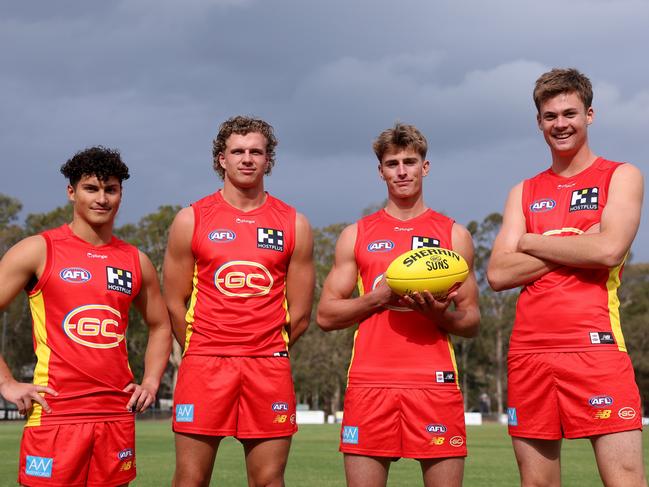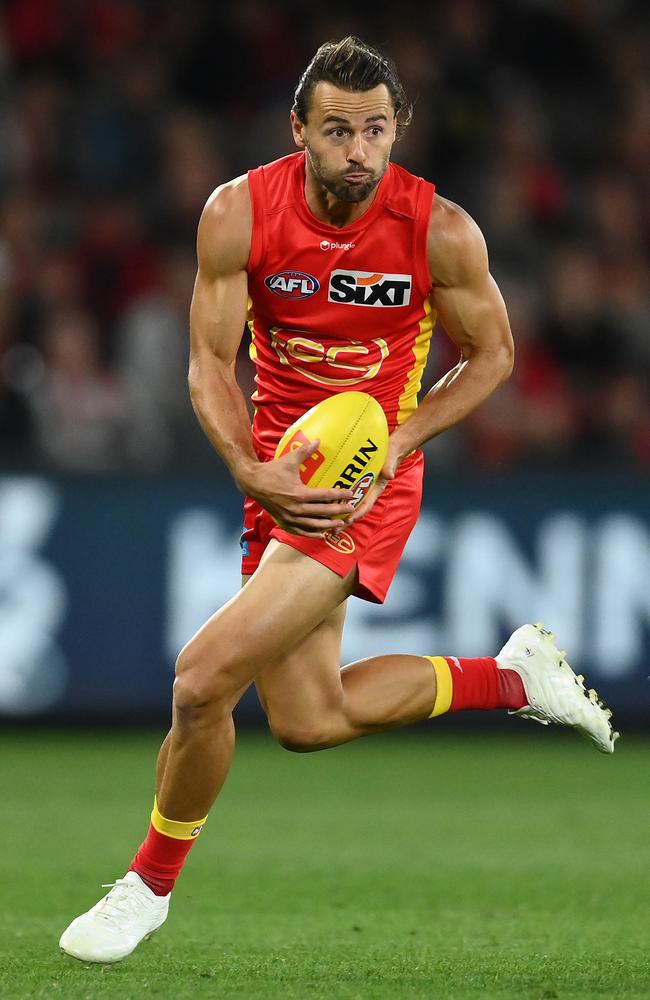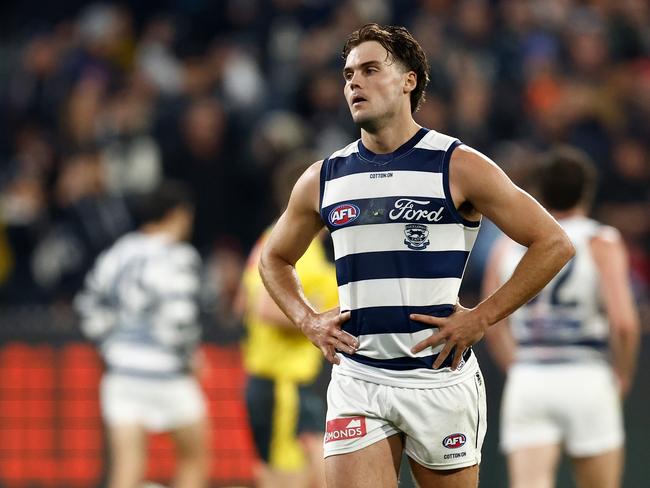AFL trade week: Why Gold Coast trades away so many first-round draft picks
Lachie Weller. Jack Bowes. Insane pick swaps. The Suns may be playing a completely different game come draft time, but it’s giving their rivals a massive leg-up.
AFL
Don't miss out on the headlines from AFL. Followed categories will be added to My News.
For the second year in a row, the AFL trade period has turned at the whim of Gold Coast deciding who to toss a prized first-round selection.
The Suns’ pick 13 is the most high-profile target of the trade period, and joins countless first-round draft selections going out the door in recent years.
Both Collingwood and Carlton led the race for pick 13, which they wanted to use on Dan Houston. They were joined by North Melbourne, Melbourne and Sydney, leaving the Suns to play puppet-master in the exchange period.
The only certainty was that come draft night, pick 13 would not be used by Gold Coast list boss Craig Cameron and the Suns’ recruiters.
At the same time, Richmond was pushing to trade Daniel Rioli for picks 6 and 23 from the Suns – and although history would suggest the Suns will roll over, they have been steadfast that the second of those picks will be staying up north.

PLAYING A DIFFERENT GAME
Are the Suns the worst managers of the AFL’s three list currencies – players, salary cap and draft picks?
In the case of the latter – no. They’re playing an entirely different draft game to every other club in the league, and could well go a three-year stretch without drafting from outside their own academy.
So clubs come knocking for golden draft picks for which the Suns have no use.
Come 2025 that may change – as the draft rules do – and matching a bid on possible pick one Zeke Uwland becomes much harder. But for now the Suns have no use for draft picks.
Last year, the they turned some tepid second, third and fourth-rounders into four sparkling first-round picks when they matched bids on Jed Walter, Ethan Read, Jake Rogers and Will Graham.

This year they’ll do the same with Leonardo Lombard, a first-round talent who oozes class, while plotting to match a bid at No.1 next season for yet another academy product in Uwland.
They don’t have a use for first-round picks. And they have all the kids in the world – what they need now is experience. And that’s how Rioli, a fine footballer but hardly a player that demands a blockbuster trade, may garner Richmond picks 6 and 23 in what experts say may be the strongest draft in AFL history.
Because the Suns don’t care. They may as well be trading away a packet of chips.
HOW DID IT COME TO THIS?
The Suns have always been frivolous spenders of draft picks, even before their academy began pumping out oodles of A-grade talent.
It’s meant a shift in the Suns’ trading strategy over the past few years, and one rival clubs have fully taken advantage of.
That’s explained in the Suns’ three-year splash of picks, which culminated in Sam Flanders, Jez McLennan and Lachie Weller at the expense of Brandon Matera and nearly more than 6200 points worth of draft capital – worth two pick 1 selections by the AFL’s draft pick value index.

In 2017, the Suns were backed into a corner by Weller’s request to be traded from Fremantle to the Gold Coast, with the league adamant the expansion club had to move heaven and earth to bring in a player who actively wanted to move across the country and join them.
Adam Saad and Gary Ablett Jnr had just departed, following Jaeger O’Meara and Dion Prestia the year before, meaning the Suns – and newly appointed footy boss Cameron – had to do anything they could to stem the bleeding.
Fremantle demanded pick 2 for Weller, who was a fine but not outstanding young prospect at the time, and eventually the Suns caved, sending pick 2 and Matera to the Dockers for Weller, pick 41 (which would become Charlie Ballard) and a future third-round selection.
Trade and draft tracking site DraftGuru gave the trade a weighting score of 261 (Fremantle) to 124 (Gold Coast).
David King said in 2019 – with the benefit of two years of hindsight – that it was a horrible decision.
“They made a huge error in trading pick No.2 for Lachie Weller,” King said. “It was like they were the only people in the world who believed this would be the way forward.”
The same year, the Suns traded picks 21, 26, 37 and a future second-rounder, which became pick 25, to the Eagles for pick 50 and the Eagles’ future first selection.
DraftGuru’s weighting of that trade? 210 to 95.
No prizes for guessing who won that trade.
It gets worse. The year after, with new coach Stuart Dew at the helm, the Suns traded that Eagles first-rounder (which at the time was pick 19, but on draft night it had ballooned out to 22 after Next Generation Academy bids and free-agency compensation), a future-second (which would be pick 23 in 2019) and a future-third (52) for Brisbane’s future first-rounder – pick 17 – which they on-traded the following year in another deal that saw them hand Carlton picks 17 and 22 (which the Suns were handed as a priority pick) for picks 11 (Sam Flanders) and 62 (unused).
And in that 2018 draft, the Suns spent picks 27 and 32 to trade into pick 23 — which was the pick after the one they traded out — to select Jez McLennan, who was laster delisted without playing a game.
In total, the Suns traded picks 19, 21, 22, 23, 26, 27, 32, 37, and 52 – spread across three drafts – for picks 11, 23 and an unused pick. Those are worth a combined 6231 points under the AFL’s draft value index, all spent for two picks worth 2144 points and another 123 points that they left to grow mould in the back of the fridge.
CATS’ DAYLIGHT ROBBERY
Until 2022, the AFL never formally approved of salary dumps, with clubs forced to sit with the consequences of bad deals and bloated contracts.
But with both its newest children struggling under the weight of big contracts, and with more young stars in line for paydays, something had to give.
For the Suns, it was Jack Bowes. A former top-10 pick, an academy prospect who was good but not outstanding, stuck on a $1.5m contract over two seasons that no one wanted to take on.
With Ben King, Matt Rowell, Noah Anderson, Jack Lukosius and the AFL’s new richest player Mac Andrew either just signing big contracts or looming, something had to give.

So the Suns were permitted to dangle a carrot by attaching pick 7 in front of clubs alongside Bowes. Geelong – the reigning premiers – offered a paltry future-third.
The Suns leapt at it, signing a deal that sent 1644 points and a former top-10 pick for a pick that was worth 220 draft points. It was then used to match the Suns’ mega haul at the 2023 draft.
It’s not the only time the Cats have fleeced the Suns. Two years earlier in 2020, the Suns gave up pick 27 to the Cats – which was pushed out to pick 33 and became Shannon Neale – for a future third-round selection tied to 2021 premier Melbourne (eventually became pick 52).
The Suns didn’t use 52, though – they traded it to Collingwood for a suite of picks, which themselves were traded off into the ether of endless pick swaps.
How the Suns manage to maintain the rage with looming changes to the bidding system from 2025 will be fascinating to watch – can Craig Cameron and his crew adapt?
More Coverage
Originally published as AFL trade week: Why Gold Coast trades away so many first-round draft picks




